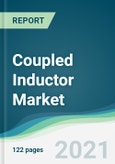Market Trends
Due to their cost-effectiveness and reduced space requirements, coupled inductors are becoming more popular in consumer electronics and the automotive industry. This coupled inductor market demand is expected to grow throughout the forecast period. When the magnetic fields of two inductors connected to two distinct circuits are brought together, the inductors transmit energy from one to the other. Coupled inductors are inductors that are used in this way. Radiofrequency identification, transformers, wireless power transfers, electric motors, and generators, as well as induction cookers, and induction heating systems, all require coupled inductors. In addition, these inductors are employed in inductive charging devices, metal detectors, and induction loop communication systems. Increasing the use of coupled inductors in consumer electronics and the automotive industry will enhance demand during the projected period due to their cost-effectiveness and reduced space requirements.
Growth Factors
Growth of the electronics industry
The rising electronics sector is projected to boost the global coupled inductor market forward. Over the previous two decades, the global electronics industry, especially for countries like Japan, China and India has seen significant transformations. with the increasing adoption of consumer electronics, medical devices, and home appliances the need for semiconductor and inductors have drastically grown. further, with huge investment in R&D, technological advancement, and automation the demand is expected to propel. The growing adoption of the Internet of Things (IoT), Artificial Intelligence (AI) is additional factors contributing to the industry. Therefore, with the growth of the electronics industry, the demand for the global coupled inductor is also expected to increase significantly in the upcoming years, propelling its market growth.
Adoption of electric and autonomous cars
Despite the decline in the automobile sector as a result of COVID-19, the industry is estimated to increase with more adoption of autonomous and electric vehicles. The government of several countries, as well as private companies, are switching to electric vehicles. In a few nations, governments are making it mandatory to utilize electric vehicles. In the United States, for example, the federal government's fleet is being converted to electric vehicles. Furthermore, states such as California and Massachusetts have pledged to phase out new gas-powered car sales by 2035. As of 2035, the European Union has proposed a ban on the sale of new petrol and diesel automobiles, accelerating the shift to electric vehicles to cut carbon emissions. Concerned about the number of carbon emissions created by fossil fuel-based vehicles, several governments are turning to an alternate source. Further, the use of coupled inductors has an increasing role to play in the automotive industry. With the growth in the automotive industry, coupled inductor market is expected to increase
Growing demand for the telecom industry
Over the last several years, there has been a tremendous increase in demand for IT/telecommunication services. The rise of the IT/Telecom sector is being driven by increased digitization, increasing reliance on cloud services, or upgrading IT-Infrastructure, all of which are fueling the growth of the coupled induction market. Increasing investments and innovations in the fields of IT and communications are driving up demand for coupled inductors, which help to improve hardware efficiency and durability.
Restraints
Conventional cars
With adoption increasing adoption of electric cars and autonomous vehicles the demand for conventional cars is reducing. With this, the coupled inductors have been affected.
Impact of COVID-19 on the Coupled Inductor Market
The COVID-19 pandemic acted as a restraint to this market growth considering the temporary closure of manufacturing facilities all around the world, as well as the disruptions in supply chains, caused because of the lockdowns. These restrictions not only hindered the operations of the global coupled inductor market players but also its end-use industries like industrial machinery and automotive among others. with an increase in unemployment, the disposable income of the people also reduces further impacting the consumer electronics and home appliances market. Thus, affecting the Coupled Inductor market.
Segmentation:
By Phase
- Single Phase
- Multi-Phase
By Application
- Converters
- Transformers
- Regulators
- Others
By End-User Industry
- Electronics and Electrical
- Telecommunication
- Automotive
- Others
By Geography
- North America
- USA
- Canada
- Mexico
- South America
- Brazil
- Argentina
- Others
- Europe
- UK
- Germany
- Italy
- Spain
- Others
- Middle East and Africa
- Israel
- Saudi Arabia
- Others
- Asia Pacific
- China
- Japan
- India
- Australia
- South Korea
- Taiwan
- Thailand
- Indonesia
- Others
Table of Contents
Companies Mentioned
- Coilcraft
- Vishay Intertechnology
- Delta Electronics, Inc.
- Wurth Electronics
- Bourns
- Eaton
- TT Electronics plc
- Pulse Electronics
- TDK CORPORATION
- Cooper Industries
Table Information
| Report Attribute | Details |
|---|---|
| No. of Pages | 122 |
| Published | December 2021 |
| Forecast Period | 2019 - 2026 |
| Estimated Market Value ( USD | $ 371.93 Million |
| Forecasted Market Value ( USD | $ 444.53 Million |
| Compound Annual Growth Rate | 2.6% |
| Regions Covered | Global |
| No. of Companies Mentioned | 10 |









